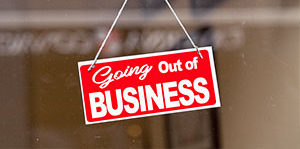There are lots of ways to start and run a successful business. However, well over half of them fail within the first ten years. Do you ever wonder how you might ruin your business? Well, for thousands of years entrepreneurs have found creative ways of doing just that. Here are a few:
1. Be Unique. Too Unique.
Finding a niche for your business idea is wonderful. In that unique space, companies can thrive for many years. A niche can create enough distance between you and prospective competitors. However, it can also generate a gap between you and potential customers. If your products and services are too unique, you may discover that there isn’t the demand you hoped for. Market research is important. Be sensitive to the needs you see out there—even around a product or service. While doing that, study competitors’ price points and business models.
2. Be Afraid. Be Very Afraid.
“Fear defeats more people than any other one thing in the world.†― Ralph Waldo Emerson
 There is a lot to be said about fear. Biologically, fear has its purpose. In business, it can be a barrier to success. Countless people fail in business, or worse yet, never launch for fear of failure. Don’t let the possibility of failure paralyze you. Work at becoming comfortable taking calculated risks and build as much support around your business as possible.
There is a lot to be said about fear. Biologically, fear has its purpose. In business, it can be a barrier to success. Countless people fail in business, or worse yet, never launch for fear of failure. Don’t let the possibility of failure paralyze you. Work at becoming comfortable taking calculated risks and build as much support around your business as possible.
3. Move Slow. Too Slow.
There are many reasons why you might choose to take your time. After all, there is wisdom in not rushing business decisions. However, moving too slow can be detrimental to a business. Here are some areas where moving too slowly will ruin your business:
- Making Decisions. Good decisions are well thought out but timely. Don’t get bogged down by the process.
- Adjusting to New Conditions. At some point, you’ll have to adapt to new market conditions, legislature, employee feedback and more. Flexibility is important.
- Ending Employee or Partner Relationships. Some relationships are not beneficial to your business. It might be a toxic employee or a partner whose goals are no longer aligned with your business. The longer you take on parting ways, the more you stand to lose.
- Fulfilling Customer Needs. It’s simple. If you take too long on this, customers will find another business. Worse yet, they’ll tell others about their untimely experience.
4. Move Fast. Way Too Fast.
The inverse of moving too slowly is also true. Businesses make tons of bad decisions because they rush, resulting in failure. Beware of moving too fast when:
- Choosing A Business Partner. Partners should be well chosen based on several characteristics that align with yours.
- Expanding Your Business. Every business wants to grow but timing is everything. Expanding with a poor business model or simply stretching yourself too thin could spell out disaster.
- Hiring an Employee or Vendor. Shop around. Do some research. Don’t be stuck with an employee or vendor that doesn’t fit your business’ needs. Both will cost you a lot.
5. Distrust Everyone and Everything.
Trust is essential to operating a successful business. Distrusting everyone and everything is not healthy for you or your company. Therefore, lacking trust in employees, partners, and even customers will sabotage your efforts to succeed.
It’s also possible to distrust non-human business essentials. For example, technology. Emergent technology can provide excellent opportunities for growth and efficiency. Yes, there can be a learning curve in adopting new technology. However, distrusting technology can cost you a lot in the short- and long-term.
6. Don’t Protect Your Business.
Protection for a company can come in many forms: physical barriers and security personnel, budgets, insurance and more. Not protecting a business is sure to ruin it when the inevitable happens. In some cases, one incident can render a business bankrupt or inoperable.
By now you realize that the key to not ruining your business is balance. A lack of balance in your strategy is a surefire way to ruin a business.
Related Posts:
B2B Tips: Retaining Top Talent
Marketing a Small to Mid-Size Business
This content is offered for educational purposes only. No warranty or appropriateness for a specific purpose is expressed or implied.

